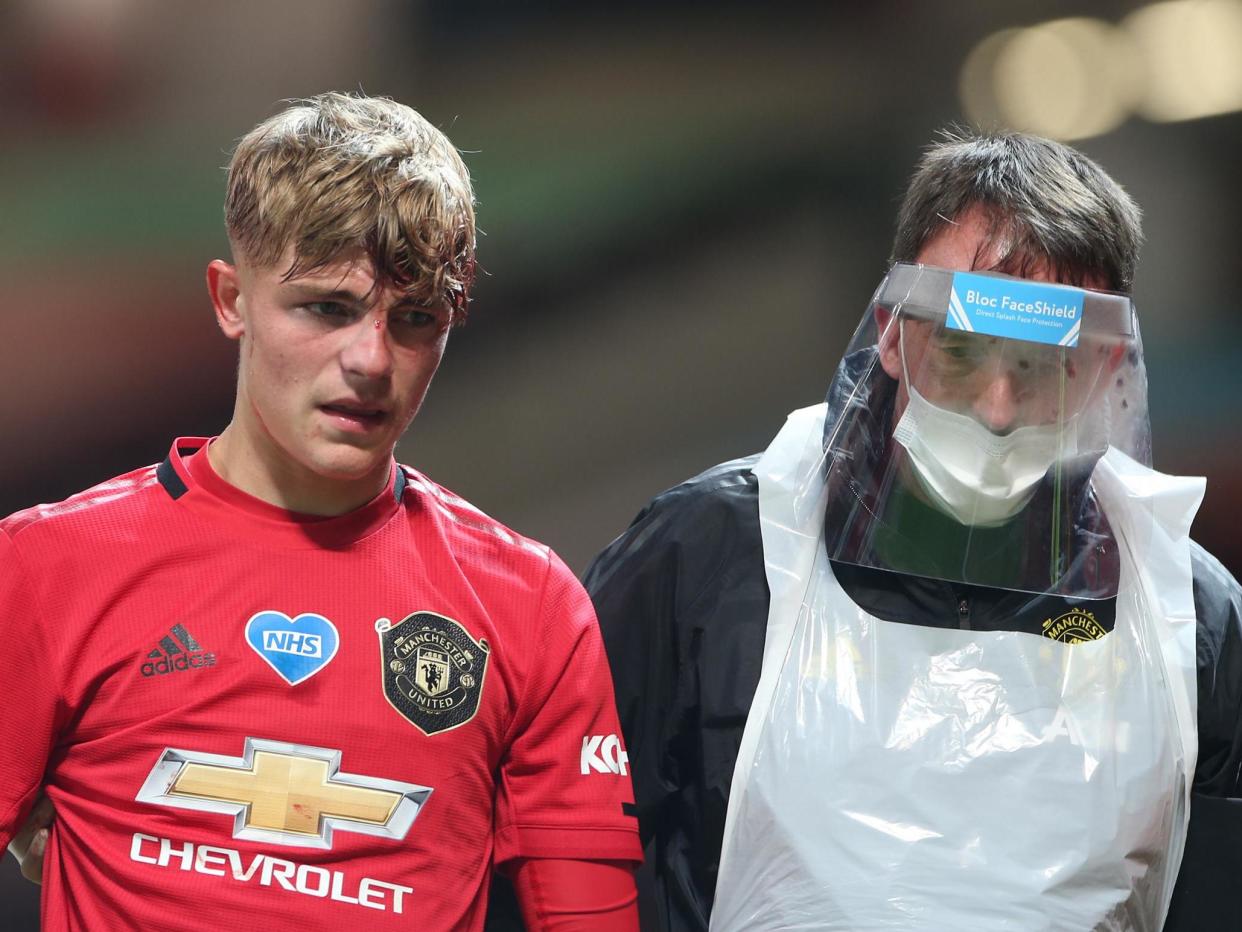Brandon Williams head injury a reminder of Premier League’s next important rule change

Before Project Restart began, there was a theory that those of us privileged enough to still attend matches would gain snippets of insight in the shouts of those down on the pitch below. In fact, it’s mostly just: ‘Man on!’, “Second balls!”, or – as Harry Maguire delicately put it after one defensive mix-up during Manchester United’s draw with Southampton on Monday night – “Fucking wake up! Every fucking time!”
But one sound that carries a new and even more chilling quality when heard behind closed doors is that of two players clashing heads. Without the murmur of the crowd there to muffle it, it is only more sickening than usual. As soon as Brandon Williams and Kyle Walker-Peters collided during the closing stages at Old Trafford, you knew both were seriously hurt. And even from the back of the Sir Bobby Charlton Stand, you could hear a piercing yelp of pain while they both received treatment.
Williams came off worse in this unfortunate incident, dazed and bloodied with a cut around his left eye. United quite rightly took no risks, taking him off the pitch despite the fact that they had no way of replacing him. Ole Gunnar Solskjaer had only used four of his five substitutions but all three of his permitted substitute windows, leaving United to defend their 2-1 lead with 10 men. Three minutes later, Victor Lindelof was left isolated on a corner, allowing Southampton substitute Michael Obafemi to score an equaliser.
Solskjaer was philosophical in his post-match press conference, even when asked an inevitable question: should there be a ‘free’ substitution for players who have suffered a head injury?
“I don’t know if you look into those rules,” he said. “It was a bad cut. [The referee, Chris Kavanagh] stopped the game when a Southampton centre-back got a calf injury and I didn’t understand that. We didn’t have too many minutes to see it out, so we should have done better. It is what it is. We didn’t have too many minutes to see it out with 10 men and we should have done better.”
It is something the Premier League have looked at though and something worthy of further consideration. World football’s law-making body, the International Football Association Board (Ifab), agreed to introduce trials for concussion substitutes at their annual meeting in February.
The measures would most likely allow managers to use an additional, permanent substitution which does not count as one of their three – or five – regular changes rather than a temporary sub, as seen in rugby union. “If there is any doubt you have to keep the player out, and for the coach to have another possibility, he knows there is an additional substitution,” Gianni Infantino, Fifa president, said after the trials were announced.
Ifab’s proposals were not without their critics. Peter McCabe, the chief executive of brain injury charity Headway, said the measures would not make much practical difference as the controversial three-minute period of assessment for a suspected concussion was set to remain unchanged. “This is yet another example of football failing to act. This latest announcement just doesn’t go far enough to protect players from the dangers of returning to play following a concussion,” he said.
“In practical terms nothing will actually change for the injured player because they are still only going to have three minutes to be assessed. Three minutes is simply not long enough to give medics a suitable window to diagnose concussion – a position that other sports, such as rugby, have quickly come to realise.”
In any case, Ifab believed more research was needed before any permanent changes could be written into the laws of the game, and invited leagues and national associations to take part in trials. Fifa were expected to test out the new rules at this summer’s Tokyo Olympics before their postponement. Mark Bullingham, chief executive of the Football Association, declared his support.
Talk of Premier League trials being implemented as early as next season also abounded, though The Independent understands that this is now considered to be unlikely.
It is something worth reviewing though, for several reasons. For one, United could feel aggrieved on Monday night that, by following concussion protocols to the letter, they were reduced to 10 men at a critical point in the game. You might argue it is no different from any other injury in that sense, except that many players have previously either felt compelled to play on with a head injury or have been encouraged to do so by their coaching staff. An additional concussion substitution would remove at least some of the incentive to do so.
But of course, far more important than United’s ability to defend corners is the health, safety and wellbeing of the players. Last December, a study found that ex-professionals were three-and-a-half times more likely to die from dementia than non-players in the same age bracket. You only have to hear the sound of a clash of heads in an empty stadium to know that any new measure which would reduce the risk of damaging, debilitating brain injuries in later life is worth further consideration.
Read more
United braced as PSG make ‘perfect’ Rashford top transfer target
Sinckler has no recollection of World Cup final due to concussion
Concussion expert advises 10-minute sub rule introduction for football
FA want ‘concussion substitutes’ introduced as soon as possible


